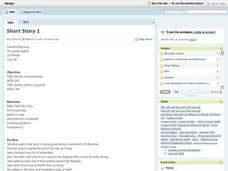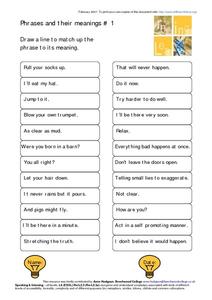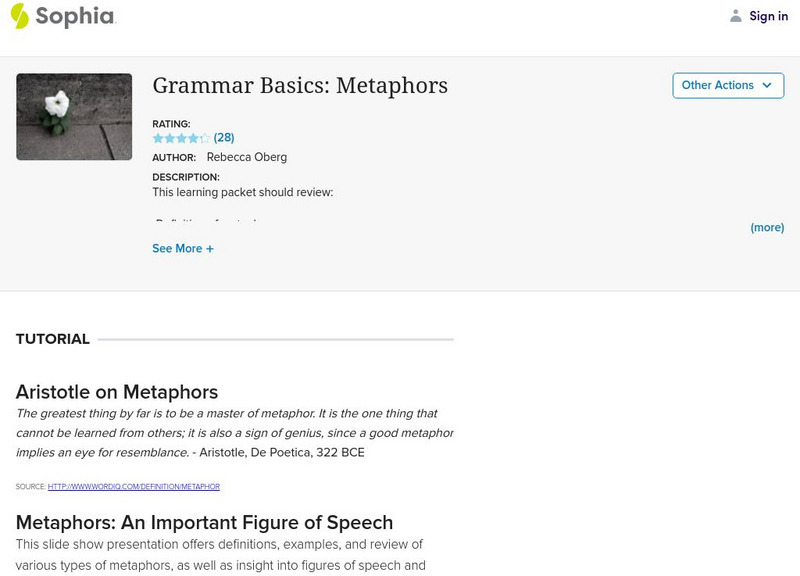Curated OER
What is Figurative Language?
Need a review of literary terms and figurative language? Although text heavy, these slides clearly define frequently used terms and provide color-coded examples.
New Vista Middle School
Hyperboles
Turn hyper bowls into hyperboles that will take away the breath of your principal and learners with the knowledge available in this presentation. The PowerPoint provides very clear and accurate information that breaks down how hyperboles...
Curated OER
Poetry Scrap Book
After your poets have compiled several written poems into a scrap-book, use this grading scale to explain how they'll be graded. The only guiding explanation of the assignment explains that they need to use two of the five literary...
Curated OER
Writer's Toolbox
Present the class with a slide show that will give them a great head start in writing expository and narrative texts. The information is highlighted for easy note taking, well organized, and presented in a kid-friendly manner. It...
Curated OER
Setting the Tone with Figurative Language
Explore figurative language with your secondary class. Extending a language arts unit, the lesson plan prompts middle schoolers to examine how an author's word choice establishes a story's tone, possibly using metaphors, similes,...
Curated OER
Identify Figurative Language
Your class can identify idioms, metaphosr, similes, hyperboles or personification by reading poetry and interpret meaning.
Florida Center for Reading Research
Vocabulary: Words in Context, Pun Fun
Scholars explore a variety of texts to locate wordplay. Partners read their selections and discuss meanings.
Curated OER
Practice Book O
Whether you need resources for reading comprehension, literary analysis, phonics, vocabulary, or text features, an extensive packet of worksheets is sure to fit your needs. Based on a fifth-grade curriculum but applicable to any level of...
Learning for Justice
Maya Angelou
Maya Angelou's poem, "Still I Rise", offers young scholars an opportunity to consider how poets use literary devices to create powerful messages. After a close reading and discussion of the poem, class members reflect on how they can...
Curated OER
Over the River and Through the Woods:Prepositional Poetry
Fifth graders will be able to identify and use prepositions correctly in written work.¿¿¿ They will also be able to identify poetic devices.They will see how their writing can be more descriptive and "visual" for their audience.
Curated OER
Vocabulary Building Cards
Students select vocabulary words from their reading each week then complete a card for each word which includes definition, source and a sample sentence. They share their cards with the class and complete vocabulary building cards...
Curated OER
Short Story
Seventh graders identify the various elements of a short story. After reading Rudyard Kipling's short story, "Rikki-Tikki-Tavi," students identify the author's purpose in writing the story as well as the elements that make it a short...
Curated OER
Those Cells Look Good Enough to Eat
Students explore the parts of the cell. In this cell lesson, students use foods to create cell models that represent the nucleus, cytoplasm, cell membrane, mitochondria, ribosomes, vacuoles, endoplasmic reticulum, and Golgi bodies...
Curated OER
phrases and their meanings 1
In this Language Arts worksheet, students match 12 phrases, such as "clear as mud," with their meanings. Students also find 3 more phrases and write their meanings.
Pennsylvania Department of Education
Storybooks and Games
Students explore stories, games and coloring pages on an interactive website. In this pre-reading activity, students have free access to stories, coloring pages and simple games at the Lil' Fingers website.
Sophia Learning
Sophia: Grammar Basics: Metaphors
Learn about similes and metaphors through this multimedia presentation. First view a slide show describing different types of metaphors as well as a simile. Then watch a video [3:13] showing similes and metaphors used in popular songs. A...
TES Global
Blendspace: Figurative Language & Tone
A twelve-part learning module with links to texts, videos, and websites on figurative language and tone.


















